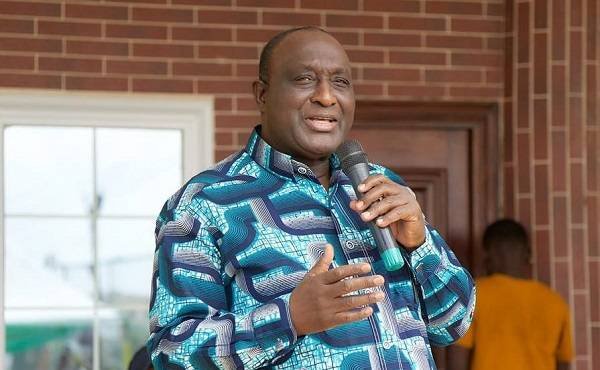
The former Trade Minister, Mr Alan Kwadwo Kyerematen, has resigned from the NPP after 46 years of membership.
The longest-serving Trade Minister, announced this at a press conference yesterday after officially submitting his resignation letter indicating he was no longer interested in being a member of the New Patriotic Party (NPP).
Surprise as it may be, to many political analysts, the handwriting was clear on the wall as speculations about Mr Kyerematen’s resignation and his move to pursue his agenda as an independent presidential candidate in the 2024 general elections intensified after his withdrawal from the NPP Presidential candidate race.
He was shortlisted as part of the top five candidates who were going into the final selection on November 4, 2023, but decided to withdraw citing “blatant alienation of his supporters which according to him were orchestrated by elements aligned to the leadership of the NPP.
This is the second time he has resigned from the NPP. The first one was in 2008 when according to him he suffered a similar fate.
Mr Kyerematen expressed disappointment that his services and contributions to the NPP have not been appreciated. His continuous stay in the Party, therefore, he believes will create further tension and division, which is an exact replay of circumstances that led to his decision to resign from the Party in 2008.
Cogent as it may be, he has not demonstrated that he is focused on what he wanted to achieve through the NPP he had served all this while. His resilience has also not been admirable. In the world of leadership, these two qualities among many others are critical in achieving objectives, especially within the political arena.
Strong leaders in most cases stick to their strategies while on the other hand, some leaders exhibit how effectively they diverge from their strategy.
In the context of leadership, this is the difference between the ability to follow established rules and the ability to achieve objectives.
However, adaptive leadership skill calls for a leader’s ability to adapt to rapidly changing situations. It includes solving problems creatively, dealing with uncertainty, learning new tasks, demonstrating interpersonal adaptability, and handling crises.
Mr Kyerematen’s resignation from the NPP is not the first. It has happened before and almost all cited similar concerns. At least political records have that of Charles Wireko Brobbey in 2000 intact.
In the bid to actualise his dream, Mr Kyerematen announced the establishment of a new movement christened “Movement for Change” in Ghana. The question since his announcement has been whether he is going to form a new political party, with the establishment of the movement.
Whatever point of view this is looked at, Mr Kyerematen aims to become the president of Ghana at all costs. In his words, “I am using this platform to introduce myself to you, the good people of Ghana and humbly seek your support to become the next President of the Republic of Ghana.”
When he threw an invitation, to Ghanaians particularly the youth to join his movement and to take their chance to take control of power and authority in the country and shape the course of their own future, the connotation was simple. He needed a political following, be it a movement or a party.
His call on the citizens of Ghana to “change the political status quo by moving Ghana beyond the duopoly of the two main political parties in Ghana; the NPP and NDC.” spells out clearly what his targets are. This will break divisive partisanship in governance in Ghana and bring an end to the “winner takes all” political syndrome.
It is a welcome one that we try other minds with different ideologies, commitment, dedication, strong leadership, corruption-free promotion agenda and genuine will to serve.
Certainly, the duopoly in the country’s politics needs to be ‘done away if it will be possible in most democracies around the globe that has been the status quo. The United States of America, the United Kingdom, Germany, France and many other nations which are rooted in democracy have two dominant political parties.
In Ghana, the two-party system has been described as a duopoly or an enforced two-party system, such that politics is almost entirely dominated by either the national democratic congress (NDC) or the New Patriotic Party (NPP) and no third party has come near two per cent in votes share during general elections since 1992.
The big question is. When did Mr Alan Kyerematen become aware of this? This is the same system he was vying to lead. If it is not the best of systems, why did he put in his all for it?
His ambition to lead a third political force needed to be looked at as it appears that floating voters in the country appear worried about the duopoly of the NPP and the NDC.
The Third Force party concept was a political alliance during the (1947–1958) period which gathered the French Section of the Workers’ International (SFIO) party, the Democratic and Socialist Union of the Resistance (UDSR), the Radicals, the Popular Republican Movement (MRP) and other centrist to contest for political power.
Since the 1992 constitution came into force, there have been two dominant political parties: the National Democratic Congress (NDC) and the New Patriotic Party (NPP). It has been extremely difficult for anyone to achieve electoral success under the banner of any other party.
The Convention People’s Party (CPP) which is a socialist political party based on the ideas of the first President of Ghana, Kwame Nkrumah, appears to be the third force but has woefully failed to make any impact by way of election results.
The Third Force party concept was a political alliance during the (1947–1958) period which gathered the French Section of the Workers’ International (SFIO) party, the Democratic and Socialist Union of the Resistance (UDSR), the Radicals, the Popular Republican Movement (MRP) and other centrist to contest for political power.
In Ghana, The Third Force Party (TFP) was a political party in Ghana during the Third Republic (1979–1981). In the 18 June 1979 presidential election, TFP candidate John Bilson won 2.8 per cent of the vote.
Since the 1992 constitution came into force, there have been two dominant political parties: the National Democratic Congress (NDC) and the New Patriotic Party (NPP). It has been extremely difficult for anyone to achieve electoral success under the banner of any other party.
The Convention People’s Party (CPP) which is a socialist political party based on the ideas of the first President of Ghana, Kwame Nkrumah appears to be the third force but has woefully failed to make any impact by way of election results.
In the history of the nation’s politics, some people have also gone solo before as presidential candidates. Mr Asiedu Walker and Jacob Osei Yeboah at least have contested for the presidency without the backing of a political party.
Others (have resigned from the NPP and) contested political positions on independent status. The current, First Deputy Speaker of Ghana’s parliament Joseph Osei-Owusu and his deputy Andrew Asiamah Amoako all had issues with the NPP and “quit” and contested their respective parliamentary seats and won. Can the same be said about Alan Kyerematen? Time will tell.
BY NANA SIFA TWUM (PH.D)



